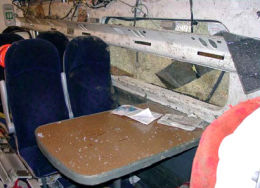Posted 5th April 2012 | No Comments
Contrite Network Rail criticised after sentence

Inside the wrecked train (RAIB)
NETWORK RAIL has been fined £4 million and ordered to pay costs of £118,052 for a breach of health and safety law which derailed a Virgin Pendolino in Cumbria just over five years ago.
The company, which was appearing for sentencing at Preston Crown Court after pleading guilty at an earlier hearing, said it had learnt from the accident, and was 'determined to recognise what we got wrong'. But the ORR has accused the company of being too slow to make improvements.
The prosecution had been brought after a Glasgow-bound train became derailed at speed on facing points near Grayrigg on 23 February 2007, and plunged down an embankment.
One passenger, 84-year old Margaret Masson, died on her way to hospital after being airlifted from the incident. 86 people were hurt, 28 of them seriously. The Virgin Trains driver was among those who were badly injured, and was kept in hospital for almost a month.
The Rail Accident Investigation Branch later found that the immediate cause of the crash was a ‘degraded and unsafe’ set of points, with fractured stretcher bar joints. The train had no defects, and was being driven correctly.
The crossover at Lambrigg was removed soon afterwards, and the Pendolino involved was written off. It is only now being replaced as part of the order for additional West Coast sets which are being built by Alstom in Italy.
Network Rail chief executive David Higgins, who joined the company as a non-executive director in 2010 and took on his present role just over a year ago, said the derailment had been a 'terrible event'.
He added: "Within hours it was clear that the infrastructure was at fault and we accepted responsibility, so it is right that we have been fined. Nothing we can say or do will lessen the pain felt by Mrs Masson’s family but we will make the railways safer and strive to prevent such an accident ever happening again.
“We have learnt from the accident, determined to recognise what we got wrong and put it right. An event like this affects everyone in the company, and especially those with responsibility for the track. Since the accident, much has changed in the way we plan and carry out maintenance work with new systems put in place to improve the quality and safety of our railway which is why we now have one of the safest passenger railways in Europe.”
The case against Network Rail had been brought by the Office of Rail Regulation on the grounds that the company had failed 'to provide and implement suitable and sufficient standards, procedures, guidance, training, tools and resources for the inspection and maintenance of fixed stretcher-bar points', and was therefore in breach of section 3(1) of the Health and Safety at Work, etc. Act 1974.
The ORR's director of railway safety, Ian Prosser, said the accident had been 'devastating and preventable'. But he also criticised the progress which the company has made since then.
He said: "I welcome the company’s progress on implementing safety recommendations made after this incident. But the pace of carrying out improvements has, at times, been too slow and the rail regulator has had to repeatedly push the company to bring about change.
“Britain’s railways are safe and are one of the safest in Europe. But there is absolutely no room for complacency. Where failings are found those at fault will be held to account and the entire rail industry must continue to strive for improvements to ensure that public safety is never put at a similar risk again.”
The rail unions have also remained critical. Before the sentence was passed, RMT general secretary Bob Crow had said: "The harsh reality is that any financial penalty on Network Rail as a result of this action will simply come out of the budget for maintenance, increasing the likelihood of another Grayrigg in the future.
“The ORR, which has brought the prosecution, has also been demanding the cuts that led to Grayrigg in the first place as it is both financial controller and safety regulator in the insane world of rail privatisation. RMT will not let them off the hook for their responsibility for the cuts programme that results from their dual role."
